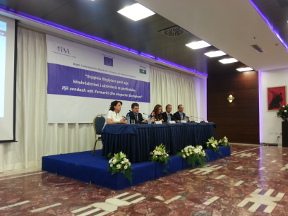The European Union has called on Albania to implement EU-wide standards in order to make its agricultural sector competitive. Since, the farming sector is valued at a fifth of the country’s GDP, it employs more than half of the country’s working age population.
“Sustaining public goods such as environmental protection, conservation of biodiversity, soil fertility and water quality, animal and plant health and rural development dimension is the basis of the European Common Agriculture Policy,” said Yngve Engstrom, head of operations for the EU delegation to Albania.
According to the results of a recent survey commissioned by the EU, more than two-thirds of Albanian farmers agree to the idea of cooperating between them, in order to boost production and trade.
The Interim Agreement on Trade and trade-related matters between the European Community and Albania, which entered into force in 2006, states the parties “shall gradually establish a free-trade area over a period lasting a maximum of 10 years starting from the date of entry into force of this Agreement.”
Since the free trade agreement is predicted to enter into force in 2017, the EU demands relate to the implementation of rules on food hygiene and official quality control. The country also needs to resolve a very sensitive problem, which is the informality in the agricultural sector.
“Informality does hinder traceability and without traceability no exports can take place – documents of origin depend on this. Albanian products cannot enter the supermarket chains as no invoices can be provided by farmers who are not formally registered,” said Deputy Agriculture Minister Alban Zusi.
In relation ot this, the survey commissioned by the EU also found that nearly 90% of Albanian farmers are not registered, and as a consequence, very few farmers are eligible to apply for EU grants.
News source/photo credits:SETimes

Leave a Reply
You must be logged in to post a comment.